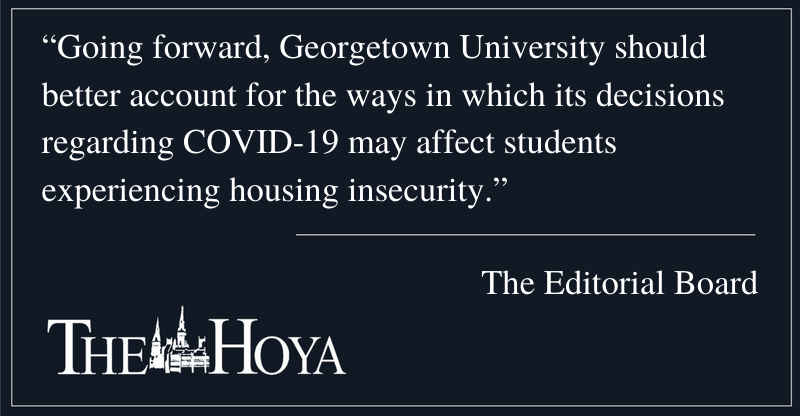When Georgetown University closed campus residences for the semester, the administration allowed some students without alternative accommodations to apply to stay on campus. Yet, with just days left in the semester, the university has not told students living on campus if they can stay for the summer.
Georgetown’s logistical decisions have understandably been delayed by the unpredictable outcomes of the COVID-19 pandemic. While the university has offered necessary services like housing refunds and limited on-campus housing options to support students, Georgetown should help alleviate housing insecurity among students by committing to continue on-campus housing for those who need it and expediting housing refunds to all students, regardless of scholarship status.
All Georgetown summer courses will take place virtually, according to an email sent to students March 27, and college students nationwide have expressed concern over whether fall semesters will take place in person. The switch to online summer classes and uncertainty over the fall semester give students reason to be concerned about whether campus housing will continue to be an option for those who need it in the coming months.
Georgetown approved continued spring 2020 on-campus housing requests for students who face housing insecurity or cannot return home during the pandemic. While these students remain on campus, Georgetown provides them with limited meal services, a university spokesperson wrote in an email to The Hoya. Georgetown did not address uncertainty over summer plans, however, until the university sent an email to students currently on campus April 22 asking if they will need additional housing over the summer. Though less than a month remains until students would have been expected to move out for the summer, the university has not said when it will notify students who have been approved to stay or whether they will allow students to stay in the fall if fall classes take place virtually.
The university should continue to offer limited housing and meal services until on-campus living can be fully restored for all students, and all students who need to continue to stay on campus should be immediately given confirmation that they may do so. The university should also provide full housing refunds to all students, regardless of financial need. The university must also better communicate with students about potential support for students experiencing housing insecurity during the pandemic.
Georgetown’s tumultuous decision-making process has inadvertently perpetuated housing insecurity for some students, beginning in March with its delayed response to students who requested to stay on campus through May.
“Things are certainly new and unknown, but the gap of time where it was undetermined if we would still have housing was incredibly stressful,” Brooklyn Owen (COL ’22) said in an interview with The Hoya. Despite the concern, Owen still feels fortunate for the services the university is providing this spring. “I am certainly privileged that they allowed us to stay.”
Georgetown’s limited spring housing has been crucial for some students, but it must avoid repeating the stressful situation it placed students in this spring as they waited to receive confirmation of housing. Georgetown should commit to continue providing housing for students who need it in the summer and fall as soon as possible.
The university’s failure to adequately address housing insecurity among students was also reflected in its decision to deprive many students with scholarships of full housing refunds. Georgetown provided housing credits to students who have been living on campus but returned to their permanent residence during the pandemic, a university spokesperson wrote in an email to The Hoya. However, students with Georgetown scholarships did not receive the same housing refunds as students without financial need, according to the university website. The university justifies this decision by putting a portion of these students’ refunds back into a scholarship pool, according to the website. This process, however, disregards the very purpose of the scholarships students receive for housing.
The portion of the Georgetown scholarship put toward housing ensures that students have an accessible place to live. Though most of Georgetown’s housing closed in March, students’ financial need did not disappear. Students who receive housing scholarships still need a safe and affordable place to stay. Georgetown’s flawed refund policy mistakenly assumes all students who rely on housing scholarships have a free, safe place to return to and thus no longer require these funds. The university cannot know about the housing insecurity its students might be experiencing due to the pandemic. Providing housing refunds to all students regardless of the financial aid they receive, however, would ensure that students receiving scholarships do not end up with fewer funds for housing than they would receive in a typical spring semester.
The university’s mishandling of housing refunds reflects a lack of understanding of how best to support its students experiencing housing insecurity. Going forward, the university should better account for the ways in which its decisions regarding COVID-19 may affect students experiencing housing insecurity.
The university’s policies have indicated an interest in supporting students experiencing housing insecurity. To do so more effectively, however, Georgetown must embrace transparent and proactive decision-making processes. Georgetown cannot control the outcomes of the pandemic, but it can and should prioritize accommodations for students experiencing housing insecurity.
The Hoya’s editorial board is composed of six students and chaired by the opinion editor. Editorials reflect only the beliefs of a majority of the board and are not representative of The Hoya or any individual member of the board.














